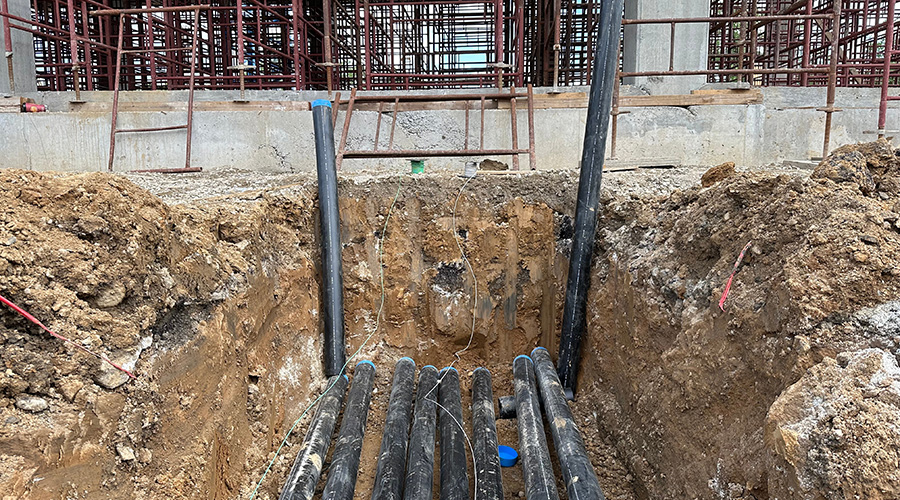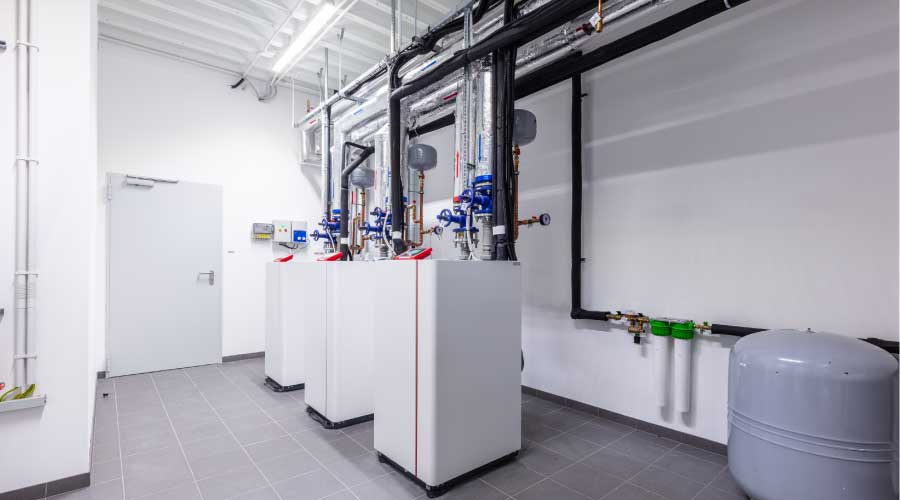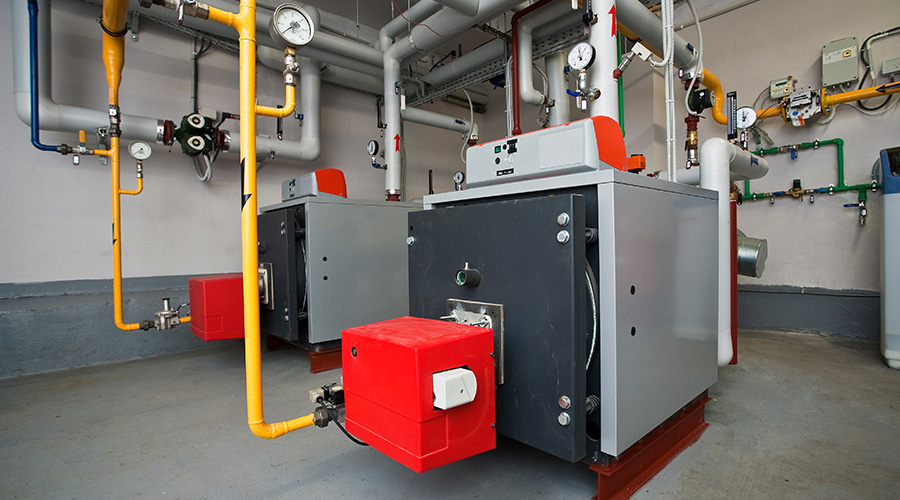Demands Change, and Technology Advances
Manufacturers discuss a new generation of boilers and water heaters that promise greater energy efficiency and occupant comfort
Few systems and products in institutional facilities escape scrutiny today from managers seeking more energy efficiency, longer performance lives and fewer maintenance problems. From chillers to plumbing, electrical-distribution and even roofing systems, managers are checking and rechecking manufacturer data, talking with peers and looking for independent verification that such systems are doing all they can do for their organizations’ bottom lines. But one group of products that has largely escaped this level of scrutiny in recent years — boilers and water heaters — now finds itself the center of attention among a growing number of managers.
Too often, boiler and water heater manufacturers say, end users have perceived their products as low-level technology and generally the same as one another. And the many types of boilers and companies that make them only complicate the issue for some end users. As a result, they pay less attention to the systems and turn their attention elsewhere.
“They all know who their chiller rep is,” says Georgann Russo, marketing manager for Aerco International. “Yet they see boilers as non-sophisticated equipment. They see boilers as simple and all the same.”
But many maintenance and engineering managers now are paying greater attention to the potential benefits offered by boilers and water heaters, and manufacturers have responded with advances in technology. The latest generation of boilers and water heaters features higher efficiencies than ever, more sophisticated controls, and more opportunities for integration with building automation systems.
Energy Efficiency
Today’s boilers offers managers improved opportunities to enhance energy efficiency. For example, high-efficiency condensing boilers offer operating efficiencies of 88-90 percent, and ultra-high-efficiency models operate in the 94-98 percent range.
Boilers in facilities might not be able to achieve these efficiencies because they often can’t duplicate the test conditions — they operate at partial load, not full load as used in testing. Still, newer models generally offer greater energy efficiencies. This benefit has become a major selling point for manufacturers.
“Now there is the realization among institutional owners and managers that these systems can pay for themselves” in a relatively short period of time, says Michael Gordon, vice president of engineering for Bradford White. “We always knew we could offer customers decent payback,” he says, but now more of them are listening.
Asserting Control
Advances in control systems also have given boilers and water heaters enhanced capability to operate more efficiently and provide space heat and domestic hot water using less energy. But this has been the case only recently due to the mind sets of both manufacturers and end users. Manufacturers now have embraced electronic controls, says Howard Holliman, manager of specialty commercial products for A.O. Smith and State Water Heaters.
“But boiler manufacturers have been real slow to move to electronic controls,” Holliman says.
Part of their challenge was deciding on the best way to change end users’ perceptions of these products and the technology used to control them. Customers tended to view boilers as relatively low-tech products and wanted them to remain that way — while still delivering greater energy efficiency.
“Customers were used to having complex controllers on their chillers but not on boilers,” says Neal Pillar, Aerco’s director of sales and marketing. In fact, manufacturers often cite the changes in chillers when discussing the evolving role of boilers and water heaters within institutional and commercial facilities.
For instance, manufacturers are looking for ways to build better connections between their products and building automation systems and energy management systems. These systems have long been able to monitor and coordinate the activities of chillers.
“Energy management systems are very good at running air conditioning systems, but they’re lousy at managing the heating side,” Holliman says, adding that customers believe that “air conditioning is where energy and money can be saved.” While true, manufacturers point out, efficiently managing the operation of boilers and water heaters can deliver similar benefits to facilities.
Previous generations of boiler and water heater controls enabled operators to monitor and adjust the equipment from individual control panels on each unit. Today’s microprocessor-based control systems allow for centralized operation of multiple boilers, even from remote locations.
“They give users more information on boiler operation in real time,” Pillar says, which means operators can detect and address problems more quickly.
Perhaps most importantly, manufacturers say, today’s controls allow managers to take advantage of energy-saving opportunities offered by replacing large units with several smaller units. Boilers tend to operate at peak efficiencies over a fairly narrow range, so by using multiple small boilers, managers can stage their operation to more closely match a boiler’s load and improve its operating efficiency.
“Multiple boilers is the way to go,” Holliman says. He notes that some end users in older and less spacious facilities are installing multiple boilers to take the place of an older unit but keeping the older unit in place. Removing the old boiler can be time consuming and expensive — especially considering many older units contained asbestos. Instead of removing them, managers decommission and encapsulate the equipment and install newer units around it. Also, most newer boilers and water heaters have much smaller footprints than their predecessors and, as a result, can fit into existing spaces without having to expand the space — another benefit.
Finally, numerous small boilers provide facilities with redundancy, should one unit fail.
Attending to Basics
Like manufacturers in any other business, boiler and water heater manufacturers have expanded their non-product offerings to customers to both build stronger relationships and generate more business. Many offer end-users training on operations and maintenance issues, as well as consulting expertise on ways to improve the energy efficiency of the systems.
But manufacturers are often shocked by the low level of care that many organizations provide to their boilers and water heaters. Russo has three words of advice for managers: “Maintain, maintain, maintain.”
One manufacturer estimated that only about one-third of his company’s customers provide adequate maintenance of these units. This type of maintenance undercuts any strategies by customers for applying controls technology to curtail energy use and extend equipment life, manufacturers say.
Even though managers understand the need for comprehensive monitoring and testing of boilers and water heaters, manufacturers say they constantly must offer reminders to perform maintenance, including: scheduling annual inspections of all waterside, fireside, and refractory surfaces; mandating that operators monitor water-treatment equipment; and scheduling inspections of safety devices, including low-water fuel cutoff and pressure-relief valves.
Manufacturers advise managers to keep an eye on several developing issues related to boilers and water heaters that are certain to affect specification. These issues include greater use of interoperability protocols in control devices, higher-efficiency products, and regulatory matters, such as expanding limits on nitrous oxide (NOx) emissions from such equipment.
Spotlight: ABMA
The American Boiler Manufacturers Association (ABMA) is the national nonprofit trade association of
-
manufacturers of commercial, institutional, industrial, and power-generating boilers
-
related fuel-burning equipment and environmental systems
-
users of boilers and boiler-related equipment
-
companies that provide products and services to the combustion-equipment industry.
The organization and its members offer a range of resources and activities.
Member companies, for example, offer training courses to the public, covering many boiler types and sizes, their operation and maintenance, and inspection criteria. ABMA also offers self-study programmed instruction courses, including a plant operator series and fundamentals of process instrumentation.
The association also offers technical information in such areas as boiler technology, combustion equipment, heat recovery, emission controls, instrumentation, aftermarket considerations, and maintenance and repair.
For more information on ABMA, contact the association at 4001 N. 9th St., Arlington, VA 22203, call (703) 522-7350, or visit the website.
|
Related Topics:











